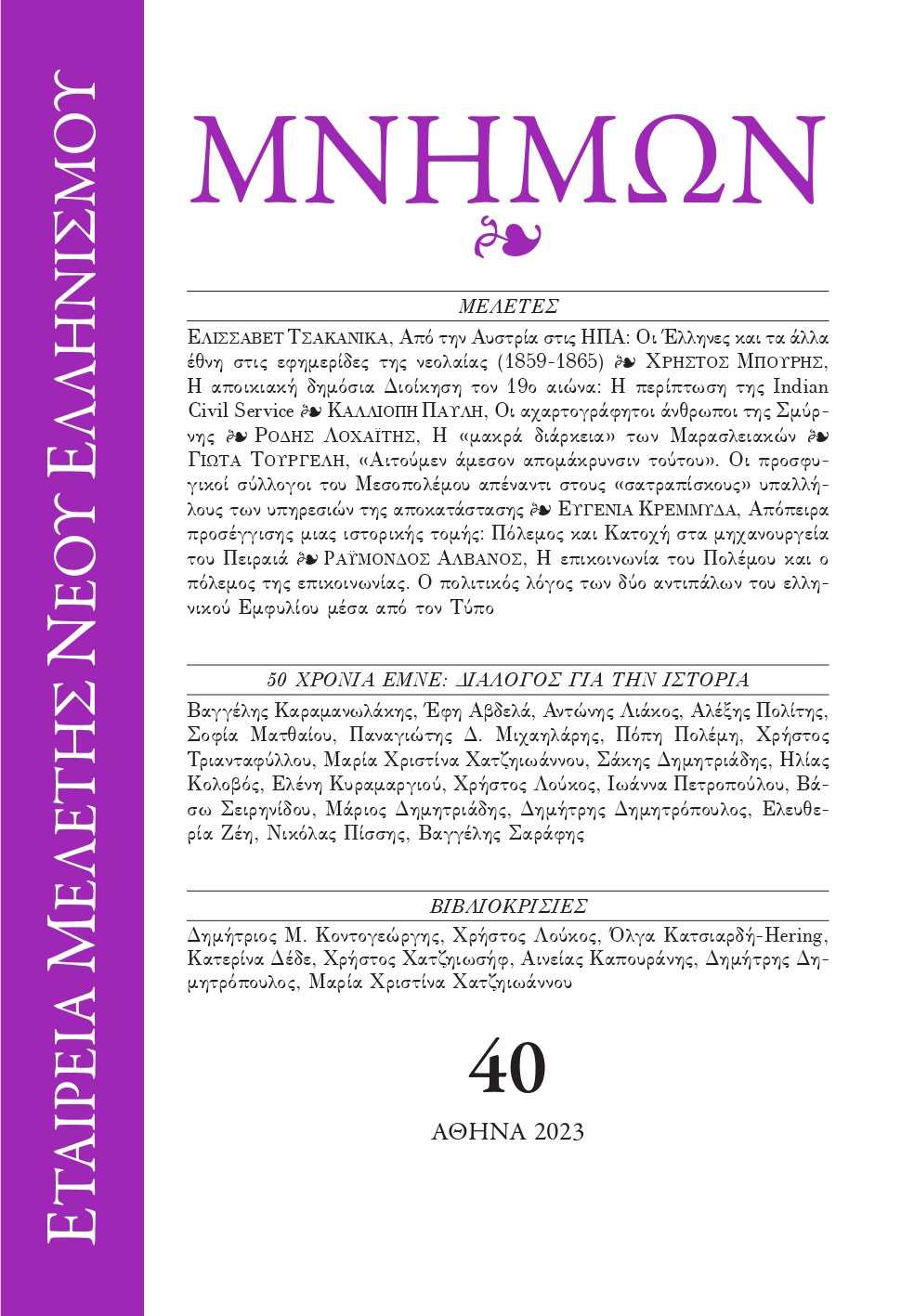ΒΕΝΙΖΕΛΙΣΜΟΣ ΚΑΙ ΕΘΝΙΚΟ ΠΑΡΕΛΘΟΝ: ΤΟ ΕΡΓΟ ΤΗΣ ΚΕΝΤΡΙΚΗΣ ΕΠΙΤΡΟΠΗΣ ΕΚΑΤΟΝΤΑΕΤΗΡΙΔΟΣ (1928-1933)
Abstract
Christos Triantafyllou, Venizelism and the National Past: The Deeds of the Central Centennial Committee (1928-1933)
This article serves the purpose of examining the organizing mechanism that led to the wide-scale celebrations of the Greek state's Centennial in 1929-1931 in the conjuncture of the last Eleftherios Venizelos' premiership of 1928-1932. The author argues that the Central Centennial Committee (CCC) was a cultural center –according to Edward Shils' definition– that was composed of political and cultural elites who sought to disseminate specific interpretive schemata through the acts of the special subcommittees of the CCC. The two main axes of this vast –in 1930's Greek standards– mobilization were the construction of a new historical narrative for the Greek national past, and the designation of the nation-state's progress since 1830. These elements can also be traced in other national case studies, like the United States (1876) or Poland (1910). The author finally argues that the mobilization of 1929-1930 was a tool in the pro-Venizelist elites' attempt of national reconstruction after the pending integration of the New Lands, and after the Greek defeat at Asia Minor in 1922. More specifically, the above-mentioned new historical narrative comprised the military successes and the territorial gains of Greece in 1912-1922, and directly connected them with the 1821 War of Independence. This narrative was disseminated through memorabilia of banal nationalism (e.g. books, stamps, popular paintings), through historical reenactments, and through the erection of monuments and commemorative rituals.
Article Details
- How to Cite
-
ΤΡΙΑΝΤΑΦΥΛΛΟΥ Χ. (2016). ΒΕΝΙΖΕΛΙΣΜΟΣ ΚΑΙ ΕΘΝΙΚΟ ΠΑΡΕΛΘΟΝ: ΤΟ ΕΡΓΟ ΤΗΣ ΚΕΝΤΡΙΚΗΣ ΕΠΙΤΡΟΠΗΣ ΕΚΑΤΟΝΤΑΕΤΗΡΙΔΟΣ (1928-1933). Mnimon, 34, 37–66. https://doi.org/10.12681/mnimon.10020
- Issue
- Vol. 34 (2015)
- Section
- ARTICLES

This work is licensed under a Creative Commons Attribution-NonCommercial-ShareAlike 4.0 International License.
The copyright for articles in this journal is retained by the author(s), with first publication rights granted to the journal. By virtue of their appearance in this open access journal, articles are free to use (with the exception of the non-granted right to make derivative works) with proper attribution for non-commercial uses (licence Creative Commons 4.0). EKT/NHRF retains the worldwide right to reproduce, display, distribute, and use articles published in Mnimon in all formats and media, either separately or as part of collective works for the full term of copyright. This includes but is not limited to the right to publish articles in an issue of the Journal, copy and distribute individual reprints of the articles, authorize reproduction of articles in their entirety in another EKT/NHRF publication, and authorize reproduction and distribution of articles or abstracts thereof by means of computerized retrieval systems.



